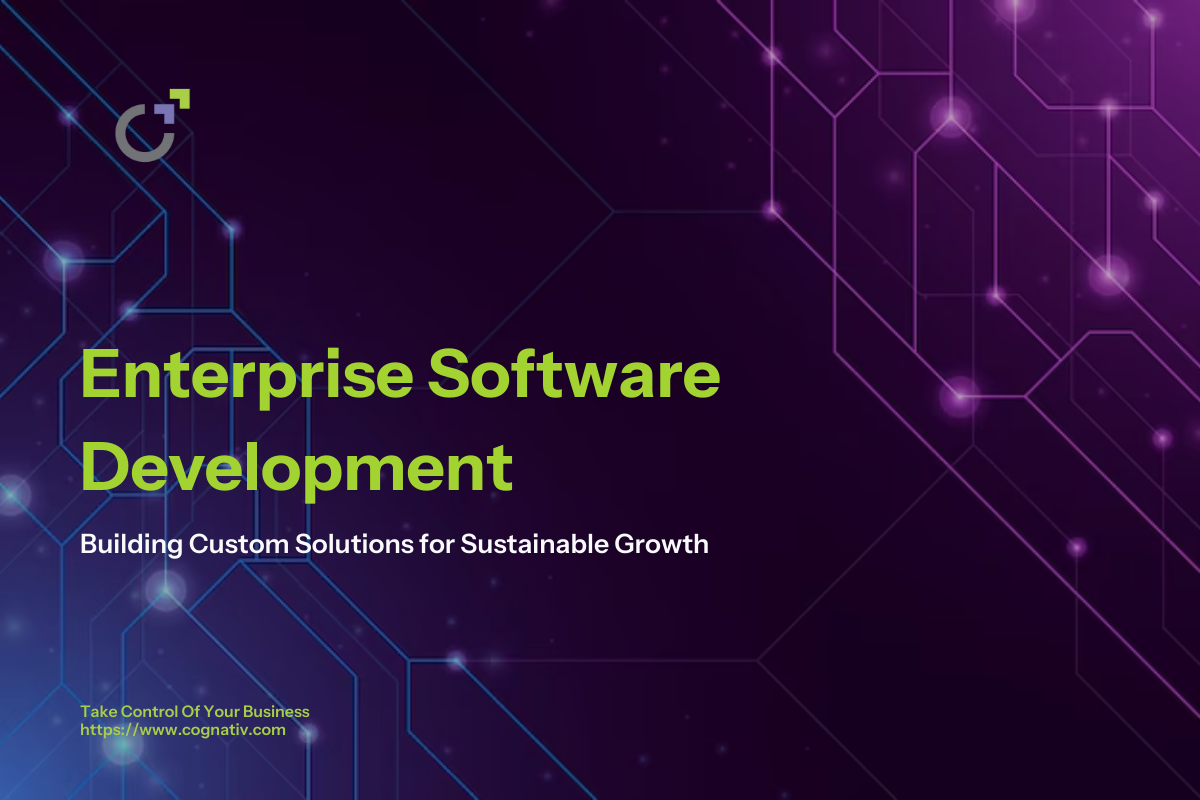Enterprise Software Development: Solutions for Sustainable Growth
Enterprise software powers the core of modern businesses, handling everything from customer management and supply chain logistics to data analytics and high-level decision-making. As companies navigate accelerated digital transformation, enterprise software development has emerged as a critical enabler for driving efficiency, innovation, and scalability. But what exactly distinguishes enterprise solutions from standard software products, and how can you collaborate with a custom enterprise software development partner to ensure a smooth, value-rich outcome?
Below, we’ll examine the fundamentals of enterprise software, its benefits, current trends, and answers to frequently asked questions such as “What is enterprise software development?” and “What are the key factors to consider when choosing a custom enterprise software development company?” Whether you represent a startup or an established enterprise, this guide illuminates the path to thriving in today’s complex business environment.
Table of Contents
- Enterprise Software Explained
- Why Invest in Custom Enterprise Solutions
- Key Components of Enterprise Software Development
- Major Trends: How Enterprise Software Development Is Changing
- Choosing an Enterprise Software Development Company
- Industry Use Cases: Who Benefits Most from Enterprise Software
- Engagement Models and Best Practices
- FAQs
- Conclusion

Enterprise Software Explained
Enterprise software development involves creating large-scale, mission-critical applications tailored for corporate or organizational use. Unlike typical consumer apps, these solutions focus on robust data handling, strict security compliance, and seamless integration with existing legacy systems. In many cases, enterprise applications are designed to support complex workflows that cross multiple departments, ensuring that even the most intricate business processes can be automated and managed efficiently.
This type of software is built to handle large volumes of data and concurrent transactions, ensuring that performance and security are never compromised. For example, an enterprise resource planning (ERP) system may integrate financial, human resources, and supply chain data into one cohesive platform, while a customer relationship management (CRM) solution helps track interactions and optimize customer service across various channels. Such systems require detailed architectural planning, modular designs, and robust maintenance strategies to support growth over many years.
By investing in enterprise software, organizations can achieve a level of operational efficiency that off-the-shelf solutions may not provide. Custom-built platforms can be tailored to unique business requirements, ensuring a perfect fit with existing processes and future ambitions. This specialization often results in improved scalability and flexibility, allowing businesses to evolve without facing significant disruptions in their IT infrastructure.
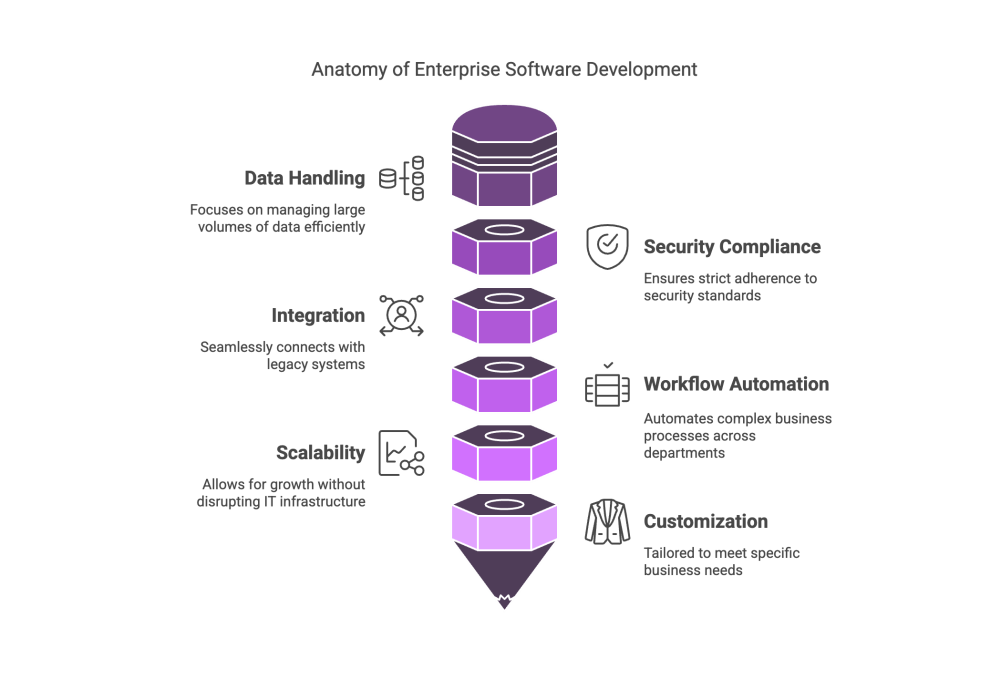

Why Invest in Custom Enterprise Solutions?
Off-the-shelf applications might address common processes, but custom enterprise solutions allow organizations to tailor features to their exact needs, offering a unique competitive advantage. Customization means that every aspect of the software can be designed to fit the specific workflow, scale, and security requirements of the business.
Investing in custom solutions can significantly enhance scalability and flexibility. As business processes evolve over time, a custom solution can adapt seamlessly without the need for expensive and disruptive migrations. Moreover, by embedding robust security measures and compliance protocols into the software, companies can safeguard sensitive data and meet industry regulations more effectively.
Another important benefit is the potential for long-term cost savings. While the initial investment in a custom-built solution might be higher than purchasing a generic tool, the reduction in inefficiencies and manual processes can lead to lower operational costs over time. A well-designed custom platform not only boosts productivity but also delivers a strong return on investment (ROI) through streamlined operations and automation.
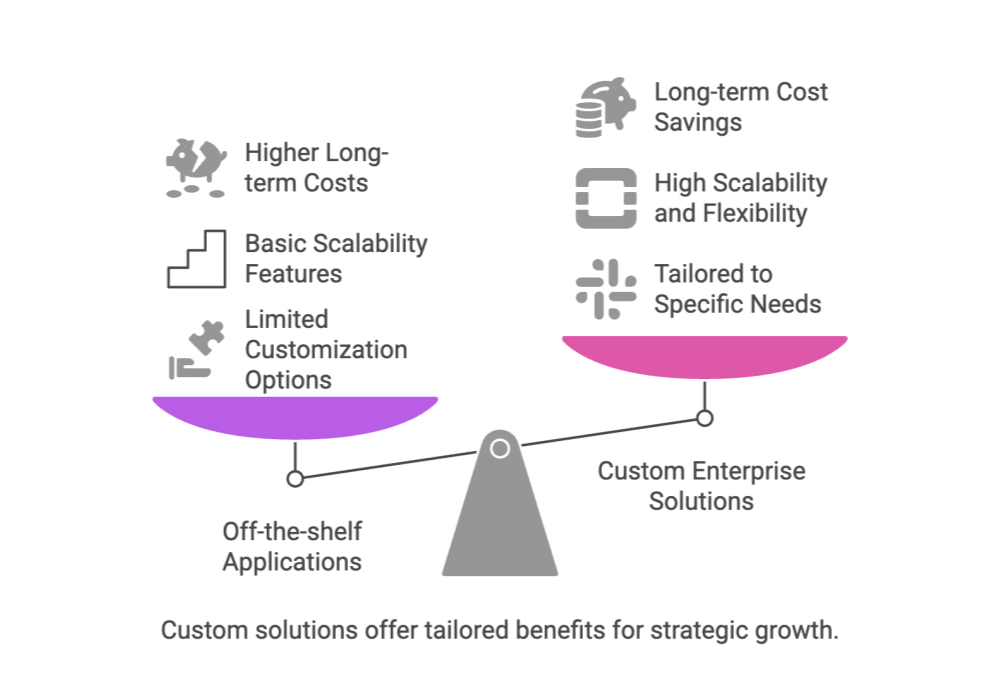

Key Components of Enterprise Software Development
Building custom enterprise software requires a deep understanding of several critical components that ensure the solution can handle complex business requirements. One of the primary components is the system architecture. Most enterprise solutions are built using layered architectures, such as microservices or service-oriented architectures (SOA), to ensure high availability and modularity.
The technology stack used can vary significantly based on project demands. For robust, high-performance systems—especially in manufacturing or engineering—languages like Object Pascal or C++ are often employed. In contrast, corporate back-end systems, advanced analytics platforms, or multi-platform operations typically utilize languages such as Java, Python, or C#. Modern, user-friendly interfaces are usually built using JavaScript frameworks like React, Angular, or Vue.
Security and compliance also play a central role in enterprise software development. Solutions must include strong authentication and authorization mechanisms, data encryption both in transit and at rest, and comprehensive auditing and logging features to track system activity. Additionally, adherence to regulatory standards such as GDPR, HIPAA, or PCI DSS is crucial, especially in industries with strict compliance requirements.
Integration capabilities are another key element. Enterprise applications must communicate effectively with existing systems such as CRMs, ERPs, and other legacy tools. This is often achieved through APIs—whether RESTful or GraphQL—and message queues like Kafka or RabbitMQ, which enable real-time data exchange and support event-driven architectures.
Finally, quality assurance and automated testing are indispensable. Given the mission-critical nature of enterprise software, rigorous testing methodologies, including unit tests, integration tests, and end-to-end tests, are essential. Continuous integration (CI) and continuous delivery (CD) pipelines help ensure that every update meets high standards for reliability and performance.
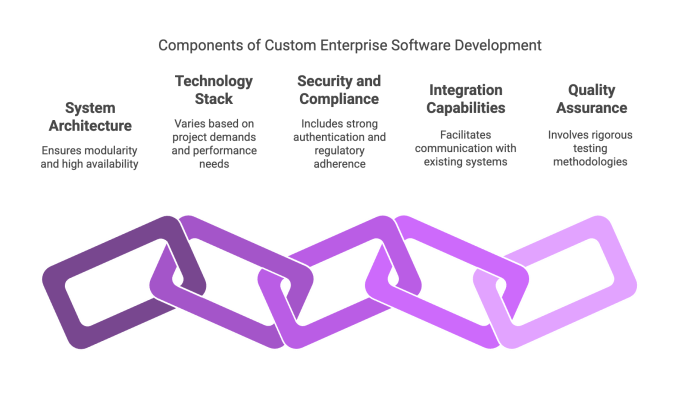

Major Trends: How Enterprise Software Development Is Changing
In recent years, several trends have emerged that are transforming the landscape of enterprise software development. One significant change is the widespread adoption of cloud computing models. By leveraging Infrastructure as a Service (IaaS) or Platform as a Service (PaaS) from providers like AWS, Azure, or GCP, developers can offload server provisioning and maintenance, allowing them to focus on feature development and innovation.
Another trend is the rise of microservices, which break down monolithic applications into smaller, independently deployable components. This not only improves agility and fault isolation but also allows for more scalable solutions. Additionally, low-code platforms are becoming popular as they speed up the development process for simpler internal applications while still requiring professional oversight for complex systems.
Advancements in artificial intelligence (AI) and analytics are also influencing enterprise software. Predictive modeling, machine learning integrations, and real-time data dashboards are being embedded into applications to provide actionable insights, optimize operations, and drive strategic decision-making. Moreover, as mobile device usage increases among employees, a mobile-first or cross-platform approach is becoming essential to ensure seamless access to enterprise systems on various devices.
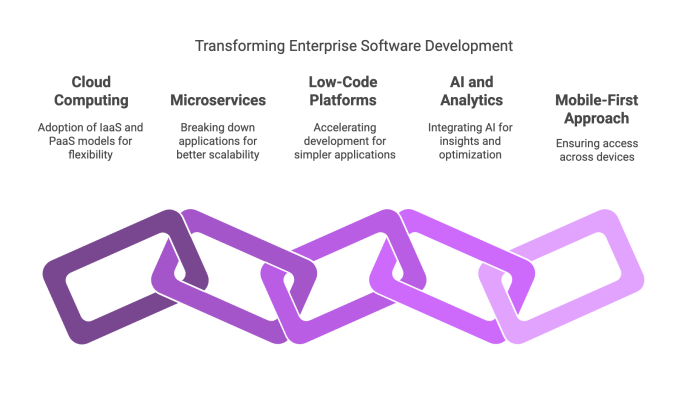

Choosing an Enterprise Software Development Company
Selecting the right partner for enterprise software development is a critical decision that can determine the success of your project. Key factors to consider include:
- Industry Alignment: Choose partners with proven expertise in your sector—whether it’s finance, healthcare, manufacturing, or another field. They will be more familiar with industry-specific challenges, compliance requirements, and best practices.
- Technical Proficiency: Evaluate whether the company has experience with the required frameworks, programming languages, and architectural patterns needed for your project. Look for certifications, case studies, and client testimonials that speak to their technical capabilities.
- Process & Methodologies: A strong agile foundation is essential. Verify that the vendor follows agile practices, such as iterative sprints, regular code reviews, and continuous integration, which are vital for adapting to changes and delivering quality software.
- Communication & Culture: Effective collaboration requires clear, frequent communication. Ensure that the vendor is committed to providing regular updates, holds daily or weekly meetings, and has a culture that aligns with your organization’s values.
- Scalability & Support: Consider how the vendor handles post-launch maintenance, bug fixes, and future expansions. A dedicated support team and clear service-level agreements (SLAs) are crucial for long-term success.
- Security & Compliance: Inquire about their security certifications and experience with regulatory standards like GDPR, HIPAA, or PCI DSS. A vendor that understands the importance of data protection and compliance is essential for enterprise solutions.
The right partner will not only have the technical skills to build a robust system but also the business acumen to understand your unique needs and deliver a solution that drives sustainable growth.
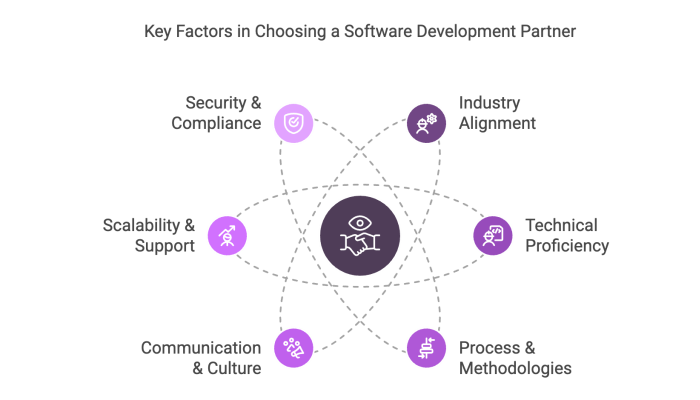

Industry Use Cases: Who Benefits Most from Enterprise Software?
Custom enterprise software development can deliver significant benefits across various industries. Highly regulated sectors or those with complex workflows are often the biggest beneficiaries:
- Healthcare: Hospitals and clinics rely on custom solutions for electronic health records (EHR), telemedicine platforms, and compliance with regulations such as HIPAA.
- Finance & Banking: Secure payment processing, anti-fraud systems, and real-time risk analytics are essential for financial institutions, which require robust and reliable software solutions.
- Retail & E-commerce: Custom platforms streamline inventory management, enhance personalized marketing, and integrate advanced customer relationship management (CRM) systems for loyalty programs.
- Manufacturing: Solutions like Manufacturing Execution Systems (MES) and supply chain automation tools enable real-time production insights and process optimizations.
- Logistics: Custom software facilitates fleet tracking, route optimization, and multi-modal shipping orchestration to improve efficiency and reduce operational costs.
In each of these domains, a tailored enterprise software solution not only streamlines complex workflows but also provides data-driven insights that help organizations stay competitive and agile in today’s dynamic market
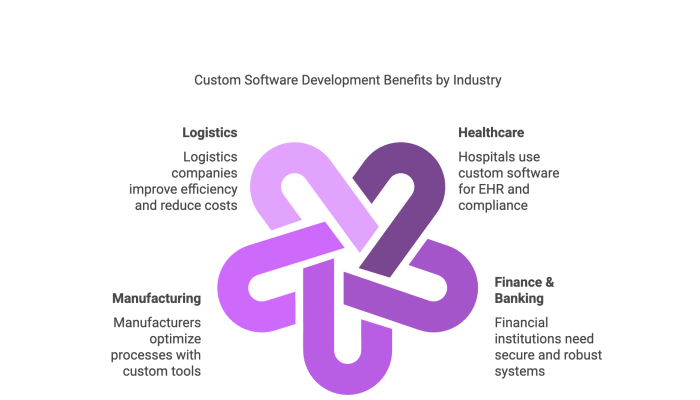

Engagement Models and Best Practices
Enterprise software development can be approached through various engagement models. These models determine how the development process is structured and how teams collaborate with external vendors:
- Full-Cycle Development: End-to-end solutions that cover everything from initial discovery and UI/UX design to final deployment and ongoing support.
- Team Augmentation: Supplementing your internal team with specialized experts from an external agency on a short- or long-term basis.
- Project-Based Outsourcing: Engaging a vendor for a defined project scope with milestone-based deliverables, often under fixed-price or time-and-materials models.
Best practices in this area include defining measurable KPIs, opting for iterative delivery through agile or DevOps pipelines, ensuring comprehensive documentation, and planning for long-term maintenance and support. These strategies not only ensure the development process runs smoothly but also set the stage for scalable and adaptable software solutions.
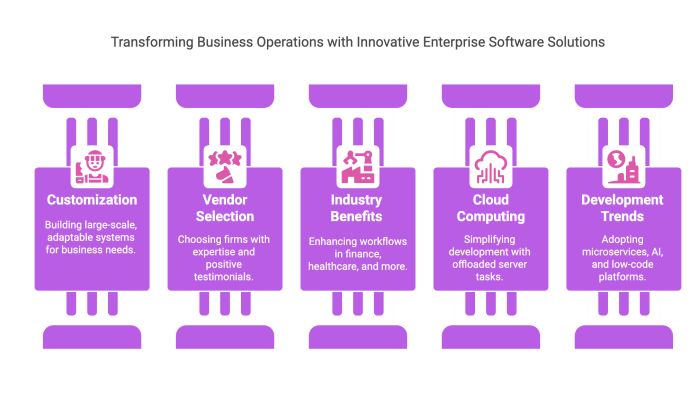

Enterprise Software Development FAQs
Below are some frequently asked questions about enterprise software development:
- What Is Enterprise Software Development? – It entails building large-scale, customizable systems that streamline critical business operations such as ERP, CRM, and specialized internal applications.
- Who Offers the Best Enterprise Software in Custom Development? – Instead of looking for a single “best” vendor, seek an enterprise software development firm with proven expertise, strong technical skills, transparent communication, and positive client testimonials.
- What Are the Key Factors to Consider When Choosing a Custom Enterprise Software Development Company? – Consider industry alignment, technical proficiency, agile processes, security and compliance records, cost structure, and post-launch support policies.
- What Industries Benefit the Most from Custom Enterprise Software Development? – Industries such as finance, healthcare, manufacturing, logistics, and retail often gain the most due to their complex workflows and regulatory requirements.
- How Does Cloud Computing Simplify Enterprise Software Development? – Cloud services (IaaS and PaaS) allow teams to offload server provisioning and maintenance, focusing more on feature development and faster releases.
- How Is Enterprise Software Development Changing? – Trends include the adoption of microservices, AI-driven analytics, low-code platforms, and enhanced security measures integrated within agile frameworks.
- What Are the Key Considerations for Selecting a Development Partner? – Look for a partner with domain expertise, strong agile and DevOps practices, clear communication, and scalable support options.

Conclusion
Enterprise software development transcends typical application creation by focusing on large-scale, secure, and integrated systems that drive sustained growth. Whether you are addressing operational bottlenecks, compliance challenges, or leveraging next-generation AI, a custom enterprise solution can provide the competitive edge your business needs.
Key strategies include starting with clear objectives, selecting the right engagement model, ensuring transparency through agile processes, prioritizing security and compliance, and planning for long-term maintenance. These practices help shape corporate resilience and innovation in a fast-evolving market.
By choosing the right partner and following best practices, your organization can deliver high-impact applications that adapt to changing technology and user demands—positioning your business for a future-proof digital landscape.

Get in Touch With Us
At Cognativ, we are dedicated to helping you build custom enterprise software solutions that drive sustainable growth. If you’re ready to explore how a tailored solution can transform your business, contact us today. Our team of experts is here to guide you through every step of the process, from initial planning to full-scale implementation and ongoing support.

